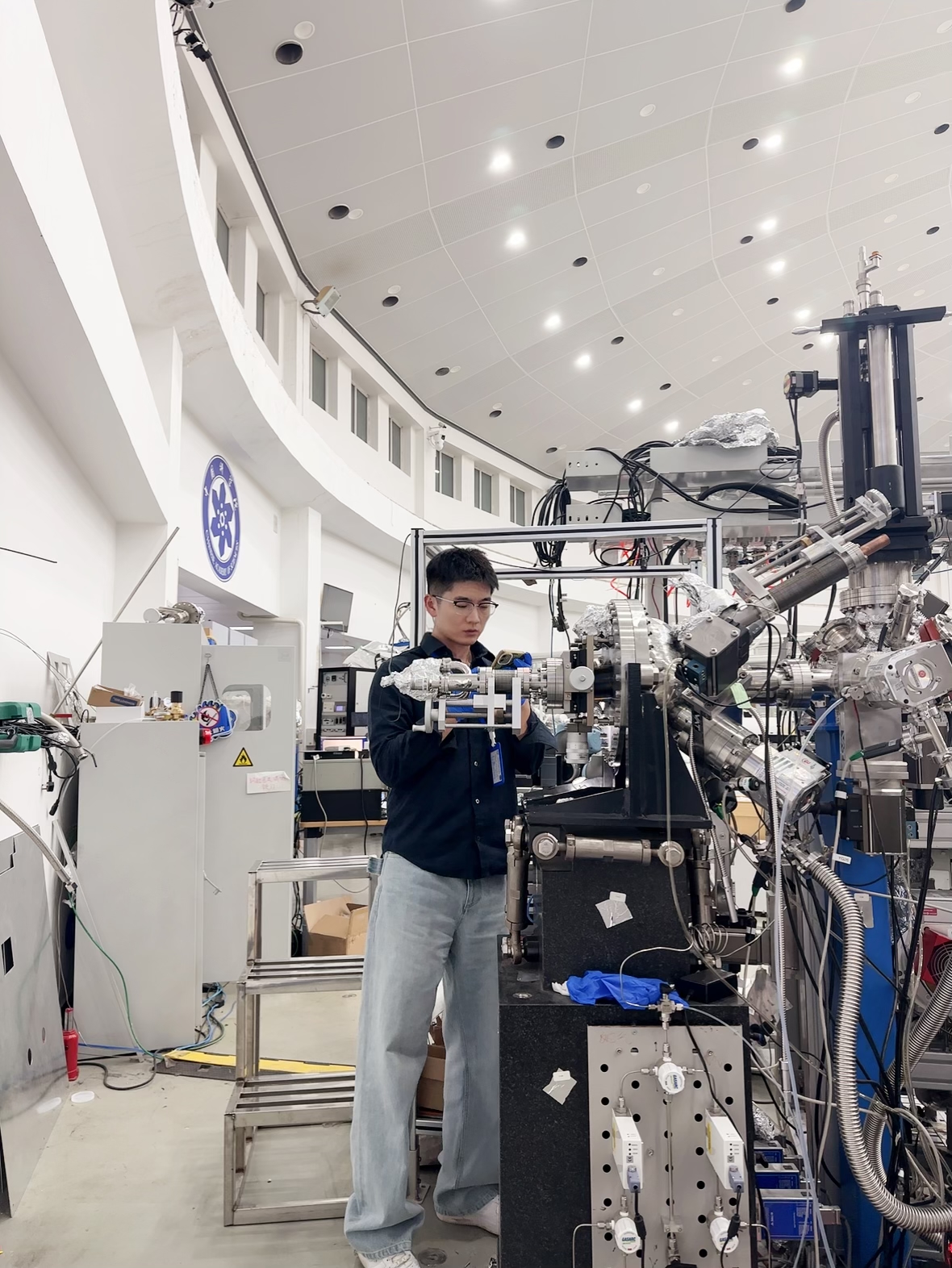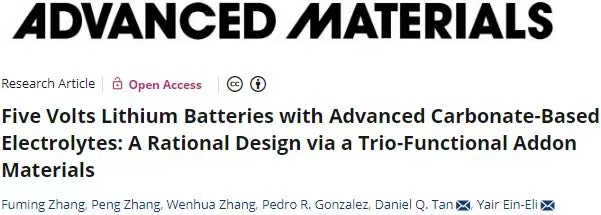PostTime:1/22/2025
From the snow-covered northern lands to the warm coastal cities, driven by the passion for scientific research, he traveled thousands of kilometers to GTIIT. With six SCI papers, two patents and a first author paper published in a top materials science journal, he filled every moment in university. In just two years, he successfully got a master’s degree from Technion – Israel Institute of Technology and chose to continue his doctoral studies in the field of lithium battery research.
Today let’s get into the story of Zhang Fuming, a PhD student in the Program of Materials Science and Engineering at the Guangdong Technion – Israel Institute of Technology.
Name:
Zhang Fuming
Program:
Materials Science and Engineering (High voltage/wide temperature electrolyte lithium batteries)
Scientific Research Experience:
Published six SCI papers and obtained two patents.
Received funding for the 2022 "Innovation Seed" program
Shantou Intellectual Property Association-Student Innovation and Entrepreneurship Patent Subsidy program
The lithium metal battery high-voltage electrolyte project received funding from the China-Israel Changzhou Innovation Park.
Made plenty of presentations in international academic conferences
Endure the loneliness
Follow your heart
The dielectric and electrochemical lab remained brightly lit late into the night. In front of a glove box, Fuming deeply focused on his experiment. Most holidays, he chose to stay in the university and spent most time in lab, excluding necessary rest. “Actually GTIIT hasn’t put too many restraints on us. I just feel since I have chosen scientific research, a path that is never easy, I must fully devote myself to it.”

Initially coming to Shantou, the warm and humid climate of this southern coastal city brought adapt issue to this northeastern boy. Luckily, that’s the only problem he had to overcome. In academics, he quickly integrated into Prof. Daniel Tan’s research group and became a helpful assistant. Mentioning his mentor, Fuming appeared grateful. “Prof. Tan is very approachable, and his teachings have benefited every member of the group.” His dedication to research and strong time management skills have subtly influenced Fuming. “During each group meeting, Prof. Tan not only delivered knowledge but also shared with us his work and life experience. Under his influence, my time management skills have gradually improved.”
The university has provided all kinds of assistance to graduate students, allowing Fuming to concentrate on research without worrying about trivial matters. The teaching model here, similar to international universities, also gives Fuming sufficient autonomy in choosing courses and research directions. After continuous trial and explorations in his master’s study, Fuming chose to stay at Prof. Tan’s research group to continue working on the field of high-voltage/wide-temperature electrolyte for lithium batteries.

“The range of electric vehicles in low-temperature environments during winter will significantly decrease, while in high-temperature, the battery is prone to overheating, affecting both safety and battery life. Therefore, the development of new electrolytes that are suitable for higher voltages and wider temperature, ensuring battery running in extreme environment, is of great practical significance.” Fuming explained. Not only electric vehicles, but the advancement of renewable energy storage systems, smart home devices and portable electronic devices all rely on the progress of lithium batteries.
In Fuming’s view, a master’s degree opens the door to academic research, while a doctorate marks the beginning of in-depth research. “During the master’s stage, time for scientific research is very limited; it’s always occupied by courses. Instead, the goal of the doctoral stage is to cultivate students into independent researchers, which means you will have a large amount of time for research.” Fuming explained.
More flexible time means heavier research tasks. During each project, Fuming needs to ensure at least six hours of experiment and two hours of reading, otherwise the plan will be hindered. Facing high-intensity challenges, he concluded a workflow suitable for himself. “Most of my output comes from the last two working hours. After a long day of experiment and reading, my mind is still active, and I have a clear picture of what should be done next. This time also gives me an urgent sense of the ‘last moment’.” After finding this pattern, Fuming tried to work for an extra two hours after completing his basic work. Relying on the “two-hour rule”, he gradually found his own working rhythm.

Scientific research is a “long term war”, with failure always following. “I have been through failure in experiments for nearly 4 months, where I could get no useful data. This is normal on the path of scientific research.” Communicating more with mentors, looking for a sense of accomplishment in research, and finding the “internal drive” guided Fuming through the periods of confusion. “I usually categorize my research topics based on their difficulty, pairing short-term, easier topics with long-term, more challenging ones, and do them together.”
After nearly a year and a half of hard work, Fuming published an article titled “Five Volts Lithium Batteries with Advanced Carbonate-Based Electrolytes: A Rational Design via a Trio-Functional Addon Materials” on a top materials science journal, Advanced Materials, with an impact factor of 27.4, as the first author. This achievement significantly promotes the performance of lithium batteries, such as their cycle life. “Many of the tests in this article were my first attempts, so it took me a long time of failure to achieve the desired results. I’m very grateful that my research group gave me a lot of resource platforms, allowing me to conduct high-end tests, which improved the quality of this article.”

Enjoy the hardship
Make each day count
During the leisure time, Fuming presents a different side of himself. Generally, he chooses to get “recharged” through activities such as swimming, playing balls, cycling and traveling. As he said, these activities have become a part of his life, and only by absorbing enough energy can he efficiently complete his research tasks. “I go to the gym every evening and go back to lab after working out. This is my way to relieve stress.”

Except for this, he also records some videos and uploads them to social media. “Initially I felt that many people don’t know much about what research life was like, and I wanted to open a window to them. Plus, videos like this were not hard to make, and didn’t take much time. It surprised me that they were quite popular.”
As a result, many people came to know GTIIT and consulted him about this university. Some have even been successfully recruited by the Technion. “I will share more stories about GTIIT through social media whenever possible. Any students who are also interested in this may join me to create better promotion videos, to let more people know these two excellent universities, GTIIT and Technion.”
Suggestions from Fuming:
Scientific research is a long and arduous path. Facing the anxiety of getting effective scientific output, I usually choose to arrange N parallel main experiments (N≥3). That’s what makes me keep going. You can divide the directions of your current work into four levels: A-Easy; B-Moderate (achievable with short-term effort); C-Difficult (achievable with long-term effort); D-Extremely Difficult (requires long-term effort and resource support, with uncertain outcomes).
A and B can be arranged as daily work, while C and D are suitable for long-term challenges. Set short-term goals of a few weeks to a month, and the more goals you achieve, the more confident you will feel. Besides, I feel that reporting results is far more valuable than discussing without results. Some may ask where to find so many A and B-level topics. My suggestion is to check the supplementary materials of CNS and its sub-journals to learn how they extend their topics. Such arrangements will appropriately alleviate mental pressure and relieve the stress of getting no results.
© GUANGDONG TECHNION-ISRAEL INSTITUTE OF TECHNOLOGY | 粤ICP备17036470号
